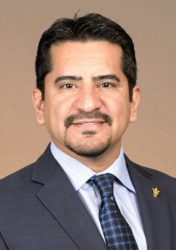
Alberto Olivas
Executive Director
Congressman Ed Pastor Center for Politics & Public Service
Arizona State University Watts College of Public Service and Community Solutions
LinkedIn | Twitter | Facebook
1. Can you please describe your work and how public policy impacts how you manage your organization?
Thanks to a gift from retired Congressman Ed Pastor, in late 2015 ASU established the Pastor Center for Politics and Public Service. The Congressman’s vision was for a Center that would help students learn the practical skills for effective political engagement and civic participation. I was hired to get the new Center off the ground, working with faculty, student leaders, and public policy professionals to find ways to fulfill the Congressman’s dream through presenting timely public policy seminars and events, training students in advocacy, citizen lobbying and voter outreach strategies, and finding other ways to help students gain valuable policy acumen and advocacy skills.
We offer scholarship programs and other financial resources to support students who want to apply their studies in ways that have real world impact on voter turnout and timely political issues. We also offer opportunities for students to shadow legislators and be matched with mentors in public service careers of interest to them.
2. How has the COVID-19 pandemic impacted your work or community?
Social distancing restrictions due to COVID-19 have eliminated nearly all in-person events and gatherings for all of ASU, including the Center. The most unfortunate result of that is having to put some of our signature programs on hiatus, specifically, those involving high school students. Normally, we offer a summer public service leadership academy for rising high school seniors, and during the school year we have our Spirit of Service scholars mentor high school juniors at our partner schools. But as schools and families struggled to make a sudden transition to distance learning, we felt the timing was not right to try to promote online versions of these programs.
We were, however, able to secure grant funding to launch some visionary youth voter outreach programs. We hired youth outreach workers to be trained by us and work with us to create their own online outreach strategies to engage other youth in discussion about election and voting issues, and to get them registered and prepared as first-time voters.
3. How has the Flinn-Brown Network been useful to you?
I have frankly under-utilized the potential of the Flinn-Brown Network, something I hope to rectify this year! The Fellows Network can be of immense benefit to the Center and our students by tapping the expertise and connections of the Fellows as speakers, presenters, and mentors for our students who are hungry to learn directly from professionals working on a wide range of social and public policy issues.
4. Tell us how the legacy of Rep. Pastor has continued in the work of the Ed Pastor Center for Politics and Public Service?
A high priority for the Center is to engage students from across the ideological spectrum and from all disciplines to engage each other effectively, and learn how to work through differences to achieve common ground objectives. If we can do that, we really are keeping the Congressman’s legacy alive. As a Congressman he rose to prominence as a leader who was trusted and respected by members from both sides of the aisle. His honesty, integrity, and focus on building multi-partisan coalitions made him a highly effective leader in Congress, and someone that everyone wanted to have on their side.
That model of inclusive, bridge-building leadership is one that we know is inspiring to students, and one that is needed now more than ever.